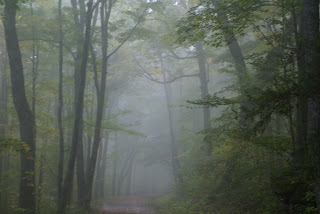
I named this blog for a response that Dylan Thomas gave when asked why he read and wrote poetry. I must admit that the poetry of Dylan Thomas was an acquired taste for me. A very good friend tried to interest me in his poetry when I was in college in the 1960's. I wasn't interested then, but as time past, I revisited the poetry of Dylan Thomas to try to discover what intrigued my friend about his poetry. And I became hooked. The larger explanation Thomas gave when asked that question were some of the first words of the paper I presented in Oxford almost five years ago. By then, he had become a major inspiration for me as a poet. He is my greatest inspiration in that regard; for, like him, I too had fallen in love with words.
…before I could read them for myself I had come to love just the words of them, the words alone. What the words stood for, symbolized, or meant, was of very secondary importance; what mattered was the sound of them as I heard them for the first time on the lips of the remote and incomprehensible grown-ups who seemed, for some reason, to be living in my world. And these words were, to me, as the notes of bells, the sounds of musical instruments, the noises of wind, sea and rain, the rattle of milk-carts, the clopping of hooves on cobbles, the fingering of branches on a window pane, might be to someone, deaf from birth, who has miraculously found his hearing.
In those few phrases, Dylan Thomas had explained what I had a hard time explaining, what words meant to me. In my life, I had seen words cause hurt, happiness, explain an opinion and describe beauty viewed. I am aware of the limitations of words as well. Try as I may, I never seem to describe a beautiful day, an autumn sunset, a snowstorm or the first flowers of spring the way these sights feel to me. Maybe I never will, but I will continue trying. For when I read Dylan Thomas, I see in words an awesome potential. And I am determined to unlock that potential in my own words.
So tonight, I offer one of Dylan Thomas best known poems. It is the poem that began the love affair that I am having with his poetry everyday I read it. While it represents not just unbelievable description, it also offers observations on life and death. Oh, but those words...
Fern Hill
Now as I was young and easy under the apple boughs
About the lilting house and happy as the grass was green,
The night above the dingle starry,
Time let me hail and climb
Golden in the heydays of his eyes,
And honoured among wagons I was prince of the apple towns
And once below a time I lordly had the trees and leaves
Trail with daisies and barley
Down the rivers of the windfall light.
And as I was green and carefree, famous among the barns
About the happy yard and singing as the farm was home,
In the sun that is young once only,
Time let me play and be
Golden in the mercy of his means,
And green and golden I was huntsman and herdsman, the calves
Sang to my horn, the foxes on the hills barked clear and
cold,
And the sabbath rang slowly
In the pebbles of the holy streams.
All the sun long it was running, it was lovely, the hay
Fields high as the house, the tunes from the chimneys, it was
air
And playing, lovely and watery
And fire green as grass.
And nightly under the simple stars
As I rode to sleep the owls were bearing the farm away,
All the moon long I heard, blessed among stables, the
nightjars
Flying with the ricks, and the horses
Flashing into the dark.
And then to awake, and the farm, like a wanderer white
With the dew, come back, the cock on his shoulder: it was all
Shining, it was Adam and maiden,
The sky gathered again
And the sun grew round that very day.
So it must have been after the birth of the simple light
In the first, spinning place, the spellbound horses walking
warm
Out of the whinnying green stable
On to the fields of praise.
And honoured among foxes and pheasants by the gay house
Under the new made clouds and happy as the heart was long,
In the sun born over and over,
I ran my heedless ways,
My wishes raced through the house high hay
And nothing I cared, at my sky blue trades, that time allows
In all his tuneful turning so few and such morning songs
Before the children green and golden
Follow him out of grace.
Nothing I cared, in the lamb white days, that time would
take me
Up to the swallow thronged loft by the shadow of my hand,
In the moon that is always rising,
Nor that riding to sleep
I should hear him fly with the high fields
And wake to the farm forever fled from the childless land.
Oh as I was young and easy in the mercy of his means,
Time held me green and dying
Though I sang in my chains like the sea.
Dylan Thomas































